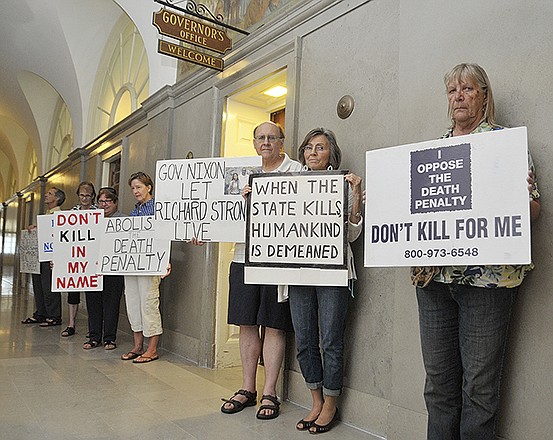ST. LOUIS (AP) - A Missouri man who killed his girlfriend and her 2-year-old daughter with a butcher knife was put to death Tuesday.
Richard Strong, 48, was executed at the state prison in Bonne Terre for the deaths of Eva Washington and her daughter, Zandrea Thomas, more than 14 years ago. He was the fourth man to die by injection in Missouri this year and the 16th since November 2013. Only Texas has executed more inmates over that span.
"Jehovah-Jireh, you're my provider. Your grace is sufficient for me. Forgive me for my sin," Strong said in his final statement, according to corrections officials.
During the execution, he breathed deeply several times and briefly raised his head from the gurney pillow before becoming motionless. He was pronounced dead at 6:58 p.m. CDT.
No family members or other witnesses attended the execution on Strong's behalf. Strong met earlier Tuesday with his mother, brother, sister-in-law and two daughters, but none of them witnessed his punishment.
Washington's sister, Virgil Samant, who witnessed the execution, said she might feel compassion for Strong someday, "but for now I don't give a damn. He can rot in hell."
The bodies of Washington and her daughter were found in October 2000 in Washington's apartment in the St. Louis suburb of St. Ann. A large butcher knife was found on a bed next to a pool of blood. Strong and Washington's daughter together, 3-month-old Alyshia Strong, was also on the bed, but wasn't harmed.
St. Ann police received a 911 call from Washington's apartment on Oct. 23, 2000, and heard a scream during it. Officers headed to the apartment, where Strong met them outside. He initially told them Washington was sleeping, then said she had gone to work.
Officers saw blood stains on his hand, and Strong tried to run. When they caught him, he admitted to the killings.
"Just shoot me, just shoot me," he said, according to court records. "I killed them."
Inside, police found the bodies and the unharmed 3-month-old.
Strong's attorney, Jennifer Herndon, said both Strong and Washington suffered from mental illness and frequently argued.
"He just snapped," Herndon said. "It was just sort of a powder keg waiting to explode. It wasn't a healthy relationship."
Alyshia Strong was taken in by Strong's mother. Despite the killings, she grew close to her father, frequently visiting him in prison. A clemency request to Gov. Jay Nixon relied heavily on Alyshia's words describing the importance of her father in her life.
"l know some people probably wonder how I can have a relationship with my father given that he killed my mother, but we are very close," the girl, now 14, wrote.
"I understand that my father needs to face consequences and to pay for what he did, but I do not think it is right for me to lose my father as part of the punishment," she added.
On Monday, in an interview with The Associated Press, she said, "I've never been angry with my dad and I've learned to forgive."
Strong's fate was sealed when Nixon declined the clemency request and the U.S. Supreme Court refused to intervene. The defense had asked the court to halt the execution because Strong was mentally ill, suffering from severe depression.
This story has been corrected to show the age of Strong was 48, not 47.


